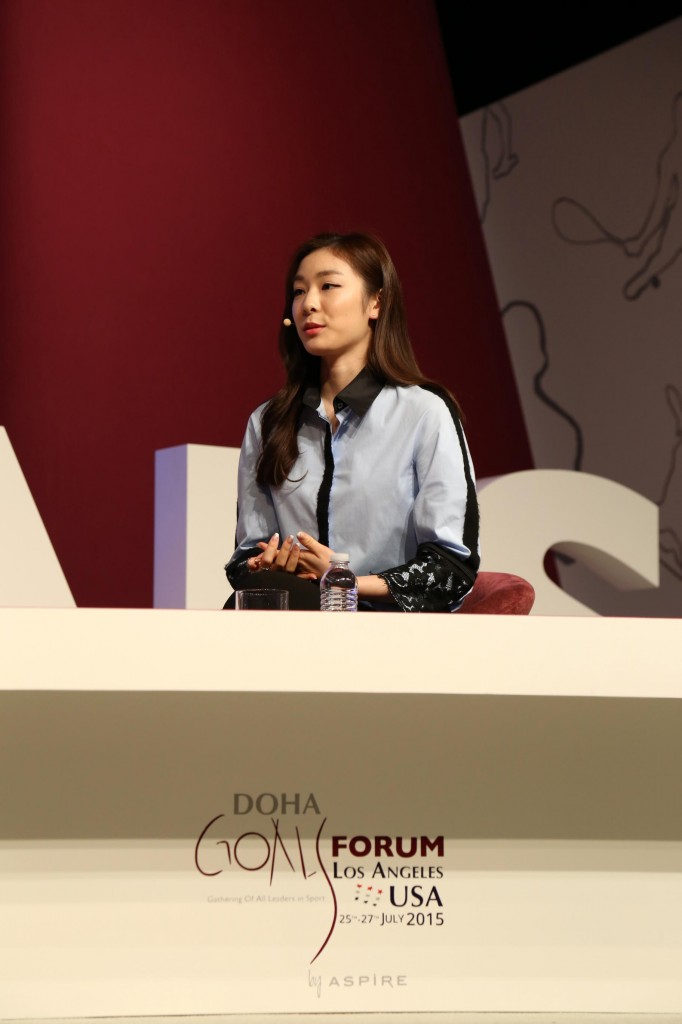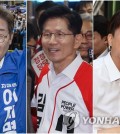- California Assembly OKs highest minimum wage in nation
- S. Korea unveils first graphic cigarette warnings
- US joins with South Korea, Japan in bid to deter North Korea
- LPGA golfer Chun In-gee finally back in action
- S. Korea won’t be top seed in final World Cup qualification round
- US men’s soccer misses 2nd straight Olympics
- US back on track in qualifying with 4-0 win over Guatemala
- High-intensity workout injuries spawn cottage industry
- CDC expands range of Zika mosquitoes into parts of Northeast
- Who knew? ‘The Walking Dead’ is helping families connect
Q&A with Kim Yuna

Yuna Kim, Special Olympics ambassador, spoke to a crowd of about 700 inside the Marriott Hotel Monday for the Doha GOALS Forum.
By Kim Chul-soo
South Korean figure skating queen Kim Yuna, in Los Angeles as a Special Olympics ambassador, held a talk in front of a crowd of about 700 inside the Marriott Hotel Monday as a part of the Doha GOALS Forum. Below is a Q&A with the world champion.
You’re in Los Angeles as a Special Olympics ambassador.
As a fellow athlete, I think it’s great to see those with disabilities cooperating with athletes from other countries through sports and working hard to achieve personal goals. I’ve had the honor of experiencing the opening and closing ceremonies of two summer Olympics games. I think it’s invaluable that athletes with disabilities can also experience moments like that, moments that not everyone has had.
Is there a moment you remember during your days as an active figure skater?
The moment I entered the Olympics for the first time is most memorable. I remember all the other competitions afterwards too, but it was a special feeling when I won the 2009 World Championship in Los Angeles that I didn’t feel even at the Olympics. I think every moment in every competition is important and valuable.
The 2018 Winter Olympics are going to be held in PyeongChang. What’s the meaning there?
For reasons including its natural environment, it’s been difficult for Korea to host the winter Olympics. For a country in which most of the winter sports have no popularity to host the winter games is a huge honor. I’m proud to be able to experience seeing my country host the Olympics, a dream for every athlete. Although I have no chance of entering the 2018 games, I’m content with being able to watch the Olympics. I hope the winter Olympics becomes a chance for Korea to receive attention from a lot of people.
You’ve shown interest in giving to charity through helping children after earthquakes in Haiti and in Japan.
I want to continue helping children have dreams and hopes. Even aside from the Special Olympics athletes, I want children who have potential and who are watching the games to form new dreams and goals.
You acted as an instructor at the Special Olympics World Games in PyeongChang two years ago. What were some challenges?
There were no challenges. The athletes were bright, and had so much passion for figure skating. Aside from results, I really liked seeing them developing toward their goals and being happy. I hope to have more chances like that one.
Do you think Special Olympics athletes are in need of anything in particular?
I think the environment is important for them, but I think before all of that, what’s most needed is the interest of people. Although it might be difficult to appeal to people in a short amount of time to be considerate toward disabled athletes, I’m going to work over time to deliver these kinds of messages.
What is your opinion of sports stars who take on roles as social advocates after retirement?
I believe that successful people in any field, including sports, have the ability to deliver a virus of positivity and optimism to people. This is definitely an opportunity. I’m going to work even harder, too, to share my story and important messages with others.
What are your upcoming plans?
Right now, I’m carrying out my duties as UNICEF Goodwill Ambassador and as an ambassador for the Special Olympics.
What kind of worldwide influence do you think you can have?
I’m not playing a huge role. Personally, it’s an honor to help others with what I have, and I hope more people gain interest in the volunteer work I’m doing.
Any advice for young athletes with disabilities?
I watched a Special Olympics basketball game yesterday, and I felt no difference between the disabled and the others. Seeing both sides become upset and angry during the game was a confirmation of equality in sports. I was touched seeing the disabled athletes focus so much during the match.
There must have been many moments during your career in which you wanted to give up. What kinds of lessons did you learn during the process of overcoming them?
I was a figure skater for 18 years, and looking back, 80 to 90 percent of that time is comprised of memories of struggle. Happy moments and victories make up only a small part of my memories. I think I worked hard for those small happy moments. Even aside from sports, there cannot be success without hardship and suffering in everyday life. I think success is overcoming those difficult moments.
Do you have last words for your fans and for the Special Olympics team?
It’s an honor for me just to be here as an ambassador for the games. I was deeply touched to see so many people genuinely cheering on the athletes here. I hope the athletes can go back home unharmed until the end and with good experiences, and I ask for support and interest.
















Pingback: English translations of Yuna’s interview at Doha Goals Forum
Alexa
December 22, 2015 at 4:54 PM
The Queen. The icon. The ice rink Boss, Kim Yuna!